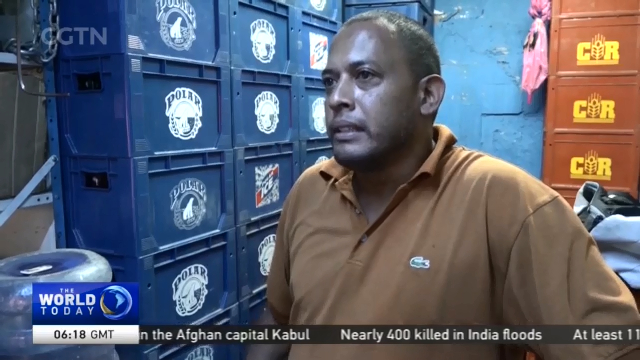
14:54, 21-Aug-2018
Venezuela Crisis: Financial reforms aim to halt economy's downward spiral
Updated
14:06, 24-Aug-2018
03:29

With Venezuela's inflation expected to increase by the end of the year, the government is making a bold move. It has converted its currency by removing five zeroes from the value of existing notes. The change is part of a plan by President Nicolas Maduro to build a new economic future. The minimum wage is also expected to rise. But critics say the numbers just don't add up. CGTN's correspondent Stephen Gibbs reports from Venezuela.
The last day of the old currency. On Sunday in Caracas we saw people queuing to spend their bolivars, in the hours before every million became ten.
The currency conversion is part of what President Maduro says will be an "economic revolution" to confront this country's spiralling inflation.
He is linking the newly-branded cryptocurrency to the value of what's called a petro-a government-produced digital money which the President says is worth a barrel of oil, or 60 dollars.
NICOLAS MADURO VENEZUELAN PRESIDENT "I have set the minimum wage, pension, and base for all salaries in the country relative to the petro."
That means that the minimum wage will go up by around 35 times. The cost of Venezuela's currently almost free gasoline, and sales taxes will also rise. Some economists argue that the sums don't add up.
ANGEL ALVARADO OPPOSITION POLITICIAN AND ECONOMIST "He's doing very badly at the moment, but this moment, this decision, is worse than anything in the past. Because it is impossible to do that. I think it is a Utopian way of life: 'I want a better place, better wages, I want a better economy.' I also want the same. But you have to work."
In this liquor store in one of Caracas' poorer neighborhoods, we got a glimpse of life and business under hyperinflation. Cash in this country ran out months ago-everything is bought with debit cards. Marco, the owner of the store, showed us a note he keeps on his fridge: a reminder of the cost of a case of beer. Every week the price goes up. Every three weeks it doubles. He said the idea that he would have to pay his workers 35 times more was alarming.
MARCO VILLEGAS STORE OWNER "It's impossible to pay that salary to a worker. This will lead to a massive reduction in the workforce."
Outside, this man was waiting to buy a loaf of bread. He felt the salary rise did make sense.
"It necessary because the prices are international here. They're the same as anywhere in the world."
But most were suspicious, and fearful, of what lies ahead. "I am going to be poorer, we are all getting poorer", said this woman.
STEPHEN GIBBS CARACAS, VENEZUELA "On Tuesday, opposition parties are calling for a general strike here in Venezuela, against a government plan which they say will only make a bad situation worse. Stephen Gibbs, CGTN Caracas."

SITEMAP
Copyright © 2018 CGTN. Beijing ICP prepared NO.16065310-3
Copyright © 2018 CGTN. Beijing ICP prepared NO.16065310-3